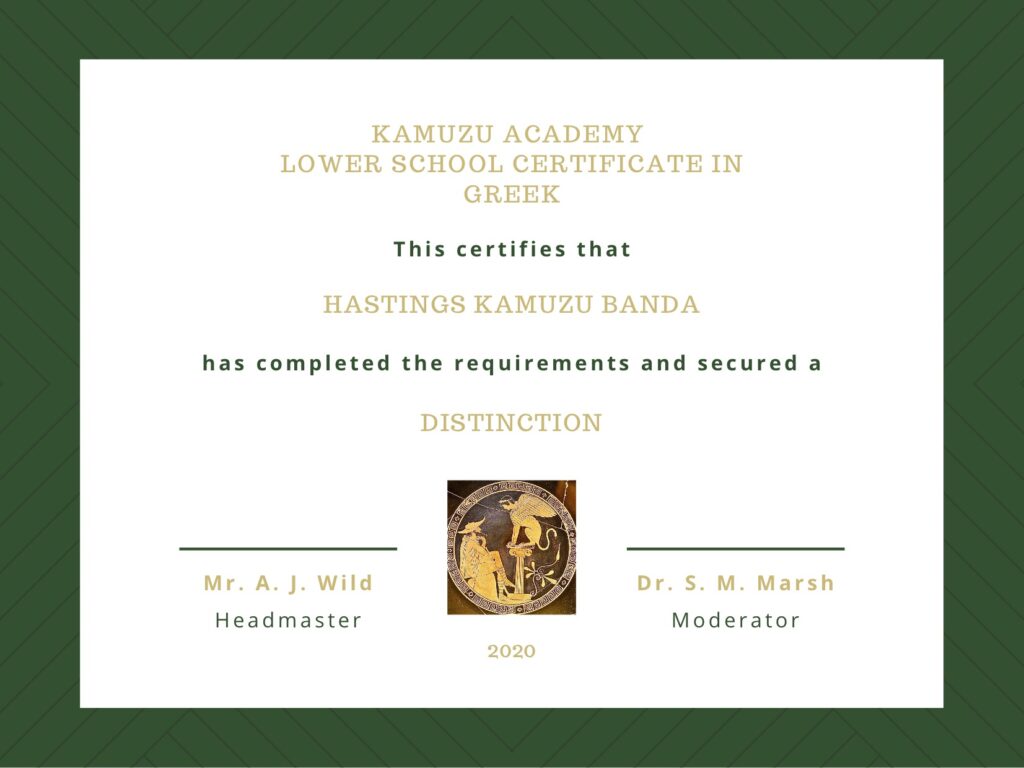Greek in the Tropics
We have just awarded the Kamuzu Academy Lower School Certificate in Greek for the second time.
The survival of the Classics in the Malawi bush is due perhaps more to the life support of presidential mandate and institutional inertia than to any respect or understanding that they command among either colleagues or pupils. There is – it must be said – little pleasure and less reward in casting Virgil before the disinterested sons and daughters of Lilongwe and Blantyre; and teaching to satisfy the 80 % A – C pass rate commanded by the Board of Governors at (I)GCSE requires all too often a travesty of what Newman, first among many, would recognise as education. And yet… As my former colleague Alexander Suebsaeng has commented in the article whence this Respite derives its title, on occasion, the Classics here can be glorious.
We used to offer Classical Greek to (I)GCSE and even to A level. That changed when, in a move that can only be considered philistine, OCR withdrew its permission to use this examination from international centres. This left Kamuzu Academy, among a number of overseas administrations of the British Classics, without a public examination in the language. Greek was retained in the lower school, with a reduced timetable of c. one hour per week, and the expectation, so the head of department, who instantiates the defeatism of those for whom the world was young in the seventies, that Greek should be taught, not even as a treat, but rather as childminding.
KALSCG (to use an acronym) was the attempt of younger colleagues to counter this: to establish a rigorous but flexible curriculum, which might shape the teaching of Greek over a two-year course in the Lower School. It rewards study of the rudiments of the language, but also the reading of real Greek – with assistance, of course – and read we have! Last year I taught two ‘third-form’ Greek sets (in the second year of the course) and we took in the Lord’s Prayer and a Gospel parable, Herodotus’ accounts of the invention of the mosquito net and of Cambyses’ embassy to the King of the long-lived Ethiopians. Ability and commitment are mixed, naturally, but most followed along, at least, and among my fondest memories is of a girl from the Northern Region, new to the school at the beginning of the year (she had to be dissuaded gently from kneeling to address her teachers), who went from learning the alphabet to reading Herodotus before the year was out. She was not alone in bringing a fresh intelligence and free imagination to the Classics. We will present certificates après-théâtre when our postponed Greek play is performed – but of the Clouds, more anon!
How much more evidence is required, in this and other spheres, that the path to capture the attention and good will of the young is not to engage in an unseemly Dutch auction to drive down the value of our inheritance, but rather – much rather – the attempt to raise them higher than they believe within their reach?
Let us enjoy the present... Alexander captures something of the epiphanic delight of teaching the Classics at Kamuzu Academy with his characteristic élan, so we will leave the conclusion of this Respite to him: “Things fall apart in Africa, it has been observed, faster or at least more obviously than elsewhere. The result is the chaos of change, decay, and novelty with which the continent is famously – even proverbially – associated. Paradoxically, this evokes a powerful sense of changelessness: against what is constant – even and especially constant change – all human activity appears feeble, all ambition futile. And from this comes a feeling of liberation from utilitarian concerns, from the prejudices of profit and loss that trouble one elsewhere. There is no justification – but there is also no need of justification. In such a place, you grow accustomed to the bizarre and accept it as you accept the terrible and the wonderful. In that huge uncluttered landscape, in its limpid air, perhaps even under a kachere tree, you see a small boy reading of Priam’s embassy to Achilles – and only rejoice in it.”
